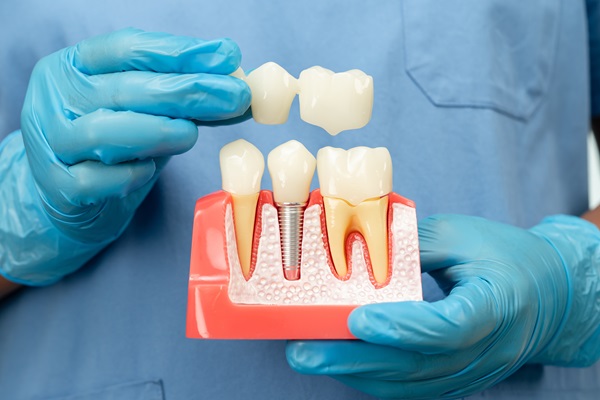Dental Implants in San Jose, CA
Losing a tooth can feel overwhelming, but dental implants offer a reliable and lasting solution to restore both your smile and confidence. This restorative treatment is designed to replace missing teeth with natural-looking, durable alternatives that function just like your own teeth. By integrating seamlessly into your jawbone, dental implants provide stability and support while helping to maintain your oral health.
Whether you're missing one tooth or several, Bay Area Dental & Implant Center can guide you through the process and ensure a smooth, personalized experience every step of the way. Book a consultation for dental implants in San Jose, CA, right now.
8 Signs that You Need Dental Implants
If you recognize any of these signs, consulting a dental implant specialist can help determine whether this is best treatment option for restoring your oral health and confidence.
- Missing One or More Teeth: If you have gaps in your smile due to missing teeth, dental implants provide a permanent and natural-looking replacement option that restores both function and aesthetics.
- Difficulty Chewing or Eating: Struggling to chew certain foods or experiencing discomfort while eating can be a sign that dental implants might be the right solution for you. They can restore full functionality so you can enjoy meals without pain or difficulty.
- Loose or Slipping Dentures: If your dentures no longer fit securely and frequently slip out of place, dental implants can anchor them, offering a more stable and comfortable alternative.
- Severe Tooth Decay or Damage: Teeth that are beyond repair from decay or trauma may require extraction and replacement. Implants serve as a long-lasting and durable solution in such cases.
- Jawbone Deterioration or Weakening: Missing teeth can lead to jawbone loss over time. Dental implants stimulate the bone, helping to maintain its density and structure.
- Chronic Jaw Pain or Headaches: An uneven bite caused by missing teeth or ill-fitting restorations can cause discomfort or strain on the jaw. Implants help restore balance to the bite and alleviate associated pain.
- Sunken Facial Appearance: Missing teeth and bone loss can cause your facial structure to appear sunken or prematurely aged. Dental implants restore proper support to your facial features, improving your appearance.
- Broken or Worn-Down Teeth: Teeth that are severely worn down from grinding, clenching, or injury may no longer be functional. Replacing them with implants ensures a reliable, long-term solution.
The Dental Implant Process
The dental implant process is carefully designed to ensure optimal comfort, functionality, and results. It begins with a thorough consultation, during which your dental provider will assess your oral health and create a personalized treatment plan.
The next step involves placing the implant, which is a small titanium post, into the jawbone. This acts as a sturdy foundation for your replacement tooth. Over time, the implant integrates naturally with the bone through a process called osseointegration, ensuring long-term stability.
Once the tooth implant has fully healed, an abutment is attached to connect the implant to the custom-crafted crown, bridge, or denture that will complete your smile. Each step is performed with precision and care, ensuring a successful outcome tailored to your unique needs.
Frequently Asked Questions
Q. How much do dental implants cost?
A. Dental implant prices vary depending on the type of treatment needed. Schedule a consultation with us to learn how much your unique case will cost.
Q. What are the 4 types of dental implants?
A. The four types of dental implants are endosteal, subperiosteal, zygomatic, and mini implants. Each type is designed to address specific needs, with endosteal being the most common and zygomatic used in cases of severe bone loss.
Q. Do same-day dental implants exist?
A. Yes, same-day dental implants do exist and can be an effective solution for eligible patients. This procedure allows for the placement of a dental implant and temporary crown in a single visit, offering immediate function and aesthetics. Find out if this is the right option for you.
Q. Dental Bridge vs. Implant: What’s the difference?
A. A dental bridge relies on adjacent teeth for support, with crowns placed on those teeth to anchor the prosthetic. Conversely, a dental implant is a standalone solution that integrates directly with the jawbone. Typically, dental implants are more durable and long-lasting, whereas bridges may require replacement or adjustments over time due to wear on the supporting teeth.
Q. What is the All-on-Four® dental implant cost compared to individual dental implants?
A. The cost of All-on-4 dental implants is generally lower compared to replacing each tooth individually with implants, as it uses just four implants to support an entire arch of teeth. While exact prices vary, All-on-4 is often seen as a more cost-effective and efficient option for full-arch restoration.
Q. Does dental insurance cover implants?
A. Dental insurance coverage for implants varies depending on the provider and plan. While some plans may cover a portion of the costs, such as the dental crown or tooth extraction, others might not include implants, as they are often considered cosmetic procedures. Contact your insurance provider for more information.
Back to top of Dental Implants

